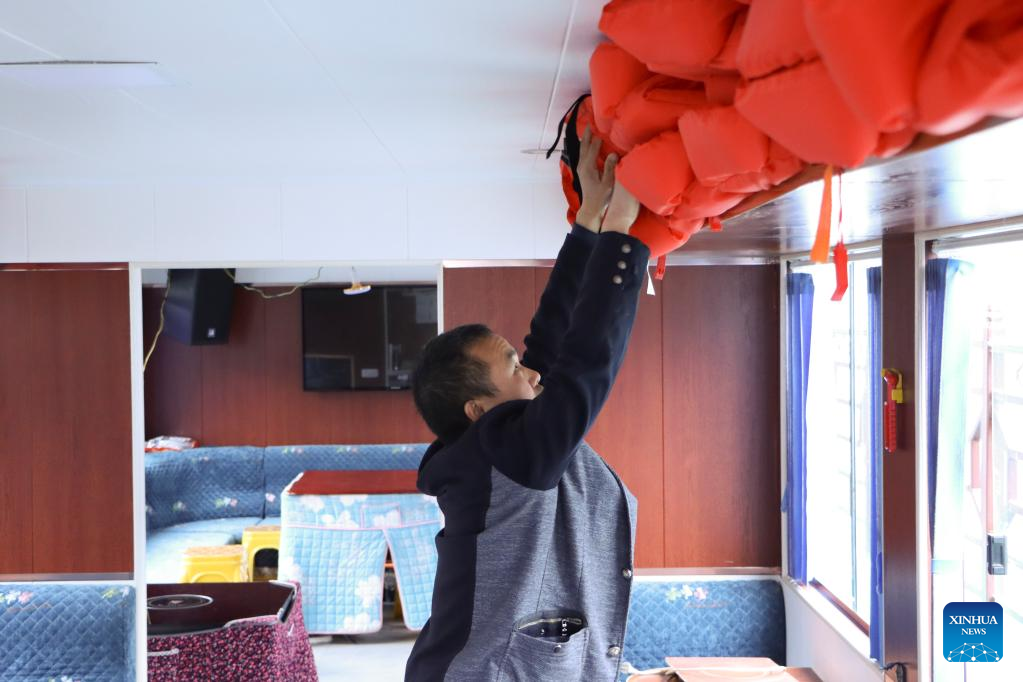New business, new life following 10-year fishing ban

Chen Xinjiang arranges life vests on his passenger boat in Sinan County, southwest China's Guizhou Province, March 28, 2023. (Xinhua/Zheng Minghong)
GUIYANG, April 23 (Xinhua) -- Cui Lanzhi's home is right next to the Wujiang River, and it's cool when the river breeze blows. The special location makes her family eatery popular among diners.
"In addition to the nearby workers, many people drive over from the county seat to eat here," said Cui, 45.
Cui, from a village in Yanhe County in southwest China's Guizhou Province, used to be a fisherwoman along the Wujiang River, a tributary of the upper reaches of the Yangtze River.
She and her husband were able to catch a lot of fish, earning more than 40,000 yuan (about 5,818 U.S. dollars) just by fishery for more than 100 days a year.
"Being fishermen is tough. We dined and slept on the boat back then, and sometimes, we fell into the river," said Cui. Luckily, both of them were great swimmers, with no life-threatening conditions encountered.
Gradually, the couple found what they could catch was less and less. In 2013, the couple invested more than 300,000 yuan, using their own house to open a family eatery. But they kept fishing to serve their customers fish.
To restore the biodiversity along the Yangtze River, China implemented a full fishing ban in 332 conservation areas of the Yangtze River basin in January 2020. The move has been expanded to a 10-year moratorium along the river's main streams and major tributaries, effective Jan. 1, 2021.
Responding to the fishing ban, Cui officially retired from fishing in 2019. Later that year, she received a subsidy of more than 70,000 yuan from the local government, which she used to expand her eatery business.
Now, the family restaurant can hold 200 people to dine at the same time, with the daily business revenue reaching some 3,000 yuan now.
"As it's getting warmer and warmer, more customers come to eat here," said Cui, adding that the business revenue can reach 5,000 yuan during the peak season.
According to the county government, all 165 retired fishermen in the county have been transferred to employment.
In Xiazhai, a village in Sinan County, Chen Xinjiang stopped fishing in 2019 and applied for a license to operate a passenger boat. Supported by subsidized loans, he bought a 50-seat vessel, which went operational last year.
"With my boat, I provide renting services to tourist groups in the daytime and offer night tours for individual travelers in the evening. The monthly business revenue reaches up to 40,000 yuan," said Chen, 50, adding that he also runs an aquatic products shop, with an annual profit of over 100,000 yuan.
Sinan County paid more than 9.4 million yuan to 121 retired fishermen in the county as compensation or incentives.
The relevant departments also guided them to start their own businesses and provided training for employment and followed-up services to ensure that every household retiring from fishing could be employed.
Chen said his wife has just received cabin service training in the city of Zunyi.
"As the tourism market has rebounded, we will be prepared for the upcoming peak season," he said.

This undated photo provided by the interviewee shows the family eatery run by Cui Lanzhi in Yanhe County, southwest China's Guizhou Province. (Xinhua)
Photos
Related Stories
Copyright © 2023 People's Daily Online. All Rights Reserved.









